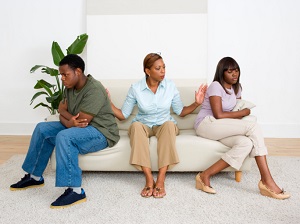 “Jeanette” and “Tim”—names and identifying information have been changed—have been married for seven years when they seek couples counseling. Tim complains to the therapist that each time the couple argues, Jeanette phones her mother, Barbara, to vent. Tim has become uncomfortable around his mother-in-law, feeling as though Barbara has formed a negative opinion of him as a result of these conversations. Tim also feels that the involvement of Barbara makes it more difficult for him and his wife to work on their marriage together. Jeanette insists that she has tried and failed to talk things out with her husband and that she needs her mother’s input in order to resolve her feelings.
“Jeanette” and “Tim”—names and identifying information have been changed—have been married for seven years when they seek couples counseling. Tim complains to the therapist that each time the couple argues, Jeanette phones her mother, Barbara, to vent. Tim has become uncomfortable around his mother-in-law, feeling as though Barbara has formed a negative opinion of him as a result of these conversations. Tim also feels that the involvement of Barbara makes it more difficult for him and his wife to work on their marriage together. Jeanette insists that she has tried and failed to talk things out with her husband and that she needs her mother’s input in order to resolve her feelings.
“Kristen” is the 17-year-old “baby” in a family of three siblings. As each of her older siblings grew up and left home, Kristen sensed increasing tension in her parents’ marriage. Recently, her father began to confide in Kristen regarding the conflicts between himself and her mother. She fears that upon her graduation from high school, her parents’ marriage may dissolve and they will seek a divorce. She is worried that her father, in particular, will be extremely negatively impacted if this occurs. Kristen’s grades have dropped and she is procrastinating on completing her college applications. She is considering staying at home to work instead of attending her dream university because she is fearful of leaving her parents “alone with only each other.”
“Joe,” “Mike,” and “Eddie” are brothers in their forties. While Joe and Mike frequently argue and find fault with one another, Eddie subsequently receives phone calls from each of his brothers complaining about, blaming, and accusing one another. Eddie feels as if he is constantly being pulled into the middle of a decades-long conflict between his brothers, and spends long hours speaking to each of them in an attempt to move them toward resolution. He has begun to avoid family gatherings in anticipation of the stress of being his brothers’ referee. Eddie’s wife “Lisa” observes the stress he is under and is frustrated by the toll this family conflict has taken on her husband.
In each of these scenarios, a dyad (two-person relationship) has become taxed and communication strangled, which has resulted in the triangulation of a third party into the relationship.
Triangulation is a family therapy concept discussed most famously by multigenerational family systems theorist Murray Bowen. Bowen described dyads as being inherently unstable under stress, much like a two-legged stool. When in balance, the dyad is capable of functioning well and meeting the needs of both people in it. However, when thrown out of balance by conflict, stress, or transitions, the dyad will often pull in a third person, or “leg” of the stool, to help them stabilize the relationship.
According to Bowen, some triangulation is normal and even healthy in the course of a family’s interactions. Because dyads are inherently unstable, the involvement of a third party can assist a two-person relationship in overcoming impasses, meeting needs, and coping through stressful times. For instance, two children who are arguing over a toy may seek out a parent to help them resolve the conflict. This kind of triangulation occurs because both of the people in the dyad are looking for healthy and effective mediation. When the triangulated person gives input, it is accepted into the dyad and processed together in a way that moves the original dyad forward in their relationship. Healthy triangulation can also occur in the context of parents (or other family caregivers) who come together to meet the needs of a third member, such as a child.
Triangulation can become unhealthy in families when it causes undue stress on the third party and/or when it prevents, rather than invites, resolution of the dyad’s conflict.
In the case of Jeanette and Tim, the triangulation of Barbara is being sought by only one of the spouses. Furthermore, the input provided by Barbara is not being brought back into the marriage for joint processing by both spouses. It is being withheld by the wife for her own individual purposes. Jeanette’s conversations with her mother are essentially taking the place of the emotional process that needs to be occurring within the marriage itself in order to return the marriage to healthy functioning.
In the case of Kristen, the 17-year-old high school student, her triangulation into her parents’ marriage is both active and passive. Her father has actively placed Kristen in the role of confidant, replacing communication that should be occurring between husband and wife. Kristen has also been passively placed by her dysfunctional family system into a role in which she must sacrifice her own individuation and growth in order to serve her parents’ emotional needs. Although her mother and father may not be expressly stating this to Kristen, the message is clear: The parents are relying on Kristen’s presence in the home in order to avoid confronting the breakdown of their marriage.
Finally, in the case of brothers Joe, Mike, and Eddie, the triangulation of Eddie over the course of many years has simply become an ingrained part of the conflict-heavy dyad between Joe and Mike. Joe and Mike have become accustomed to being able to discharge the anger and tension of their dyadic relationship onto a neutral party. After they utilize Eddie to manage their emotions, they return to their battles with one another with ever-renewed energy. The triangulation in this case is a piece of the unhealthy cycle rather than an honest attempt to seek mediation. Eddie has begun to bear the symptoms of the dysfunctional relationship, and his own bonds with uninvolved family members are crumbling under the weight of his “referee” role.
It is predictable that everyone will encounter triangulation in their family relationships at some point, whether as one of the dyad seeking stability or as the third party who is being put in the middle. If you find yourself involved in a triangle, it is helpful to ask yourself a series of questions in order to determine whether this triangle will ultimately be beneficial or harmful to the family system:
- Are both people in the original dyad jointly seeking the input of the triangulated member?
- Is the input of the triangulated member being brought back into the dyad itself for mutual discussion and consideration?
- Is the dyad openly and directly communicating with one another before, during, or after the triangulation occurs?
- Is everyone involved, including the third party, able to speak frankly and express their own emotions and opinions authentically?
If the answers to the above questions are yes, then the triangulation is likely to be of the normal type which necessarily occurs in families over time.
- Does any member of the triangle feel overly forced, pressured, stressed, blamed, or manipulated by the interaction?
- Does any member of the triangle feel as if he or she is not allowed to speak freely, express emotions, or ask for needs to be met?
- Is the triangulated member being pulled into an inappropriate role (such as a child being parentified or overly confided in by a parent)?
- Is this part of an ongoing pattern of interaction in which the original problems never seem to be resolved?
If the answers to the above questions are yes, then the triangulation may be the type that is unhealthy and dysfunctional in the overall family system.
If you find that unhealthy triangles are occurring in your family, there are steps you may take to counteract the negative effects of such triangles:
- A triangulated person can decide to step out of the middle by refusing to speak about the conflict with the involved members. The triangulated person may inform the two people in the dyad that he or she will continue to have a relationship with each of them that does not include taking a referee, peacemaker, or other inappropriate role.
- Encourage the original two-person dyad to speak to one another rather than projecting their conflict outward. Open, honest, and direct communication between family members is the most efficient antidote to dysfunction in families.
- If a triangle is still needed for the dyad to stabilize, encourage the two people to seek a professional mediator, counselor, or therapist. The professional will likely become triangulated, but can step into the triangle with a background of training and objectivity which will allow the professional to work from his or her triangulated position to help the dyad return to healthy functioning.

The preceding article was solely written by the author named above. Any views and opinions expressed are not necessarily shared by GoodTherapy.org. Questions or concerns about the preceding article can be directed to the author or posted as a comment below.

 HELP! Our Family is Addicted to Yelling
HELP! Our Family is Addicted to Yelling Dividing Family Loyalties When You Marry
Dividing Family Loyalties When You Marry The Things They Say: Friends, Family, and Fertility
The Things They Say: Friends, Family, and Fertility

